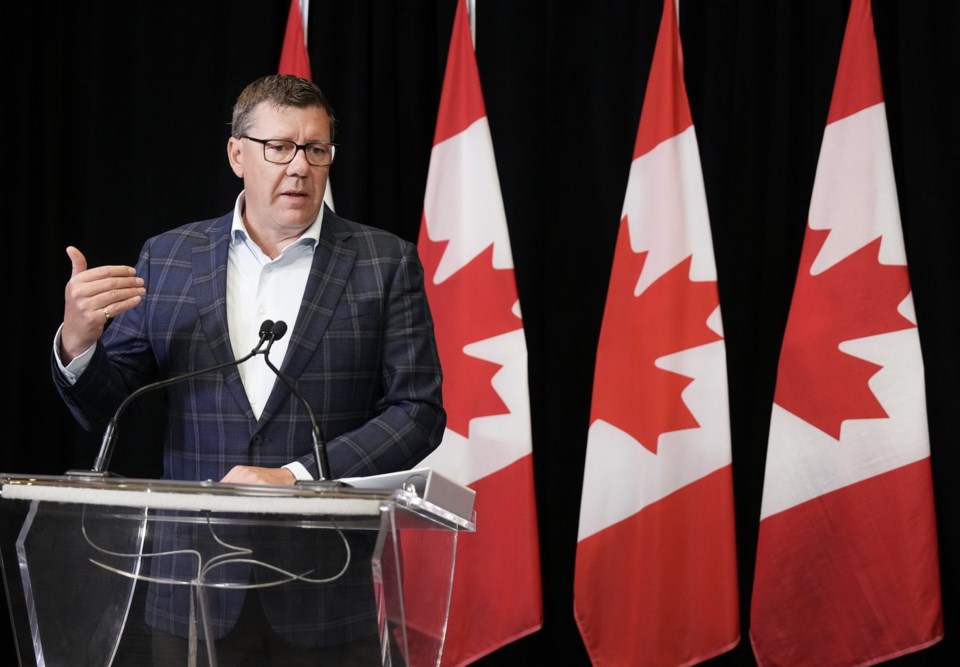REGINA — As Saskatchewan Premier Scott Moe prepares to go to China next week, he said he would like the federal government to drop its 100 per cent electric vehicle tariff on Beijing.
“From Saskatchewan’s perspective, I would say, ‘Yes, let’s remove the EV tariffs,’” he told reporters Tuesday.
But, he added, there’s a big caveat around making sure that Canada stays on good terms with the United States.
“We need to ensure that we are balancing off all the direct and indirect costs of (removing the EV tariff), because our largest canola market still remains to be the United States of America.”
Moe's comments come as a Chinese tariff of nearly 76 per cent remains in force on Canadian canola seed, a measure that has slashed the value of one of Canada's — and Saskatchewan's — most valuable crops by millions.
Beijing’s duty on canola seed was seen as a response to Canada's 100 per cent tariff on Chinese electric vehicles. China has also slapped Canada with 100 per cent duties on canola oil and meal.
Canada has justified its levies on Chinese EVs by arguing they protect planned investments at home. Canada's move was in lockstep with then-U.S. president Joe Biden, who also slapped tariffs on Chinese EVs.
Asked how Canada could remove the electric vehicle tariff without angering President Donald Trump, Moe said there are sensitivities to consider.
"Herein lies the line that we need to walk," he said.
Moe said the United States is the top importer of Canadian canola, followed by China. He added the path includes Canada expanding exports to China, while ensuring its trading relationship with the United States remains solid.
"That's the challenge and it isn't easy," he said.
Moe is the latest Prairie premier to call for the removal of the EV tariff.
Alberta Premier Danielle Smith told the audience of her provincewide call-in radio show Saturday that the duty should be scrapped.
"Figure out a way to normalize the relationship, find another way for us to be able to negotiate with our U.S counterparts, and keep those two relationships separate," Smith said.
"I mean, we're seeing Americans doing it. Americans are developing a separate trade relationship with China."
Moe is slated to visit China next week on a trade mission and has invited Prime Minister Mark Carney and other federal ministers to join him.
He said Tuesday he's still ironing out the details on which Chinese officials he plans to meet with.
The premier also hasn't heard back on whether Carney or other Canadian ministers will be there, he added.
"We don't want to be rude and we understand that we're going to have to work together with our federal government to come to a resolution," Moe said.
"Our goal is to advocate and get to the point where the prime minister and (Chinese President Xi Jinping) can come to an agreement."
Saskatchewan Opposition NDP Leader Carla Beck told reporters earlier Tuesday the goal should be for China to remove its tariffs on all Canadian canola products.
“If that means putting the removal of EV tariffs on the table, then that’s something that we should look at," Beck said.
The canola seed tariff came into force nearly a year after Beijing launched an anti-dumping probe into Canadian canola.
China’s Ministry of Commerce has argued Canadian canola companies were dumping the product into the Chinese market, hurting its domestic canola oil market.
Ottawa and farmers have denied dumping, saying exporters are following rules-based trade.
The federal government has given China until September, when the anti-dumping investigation formally ends, to make a final decision on the duties.
Ottawa has said it can extend the deadline by six months.
The canola industry contributed $43 billion to Canada's economy last year and employed 200,000 people.
This report by The Canadian Press was first published Aug. 26, 2025.
— With files from Fakiha Baig in Edmonton
Jeremy Simes, The Canadian Press



